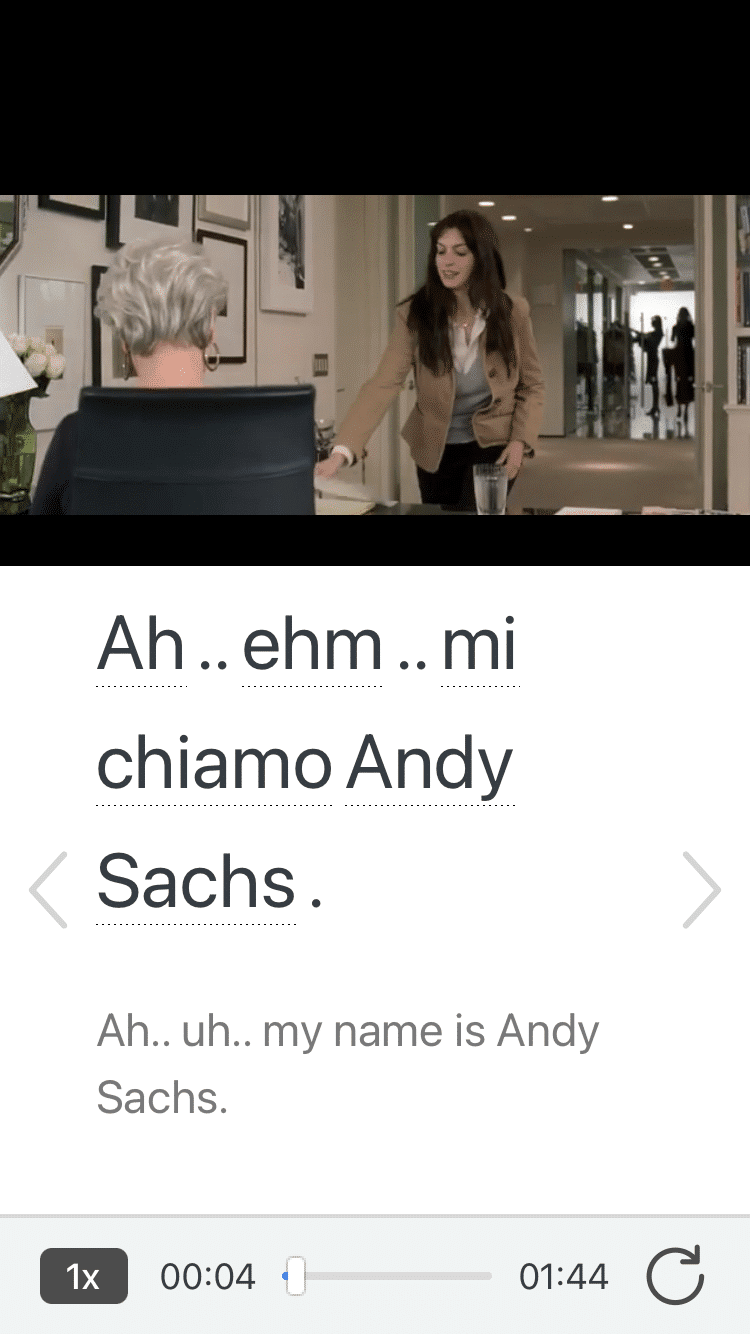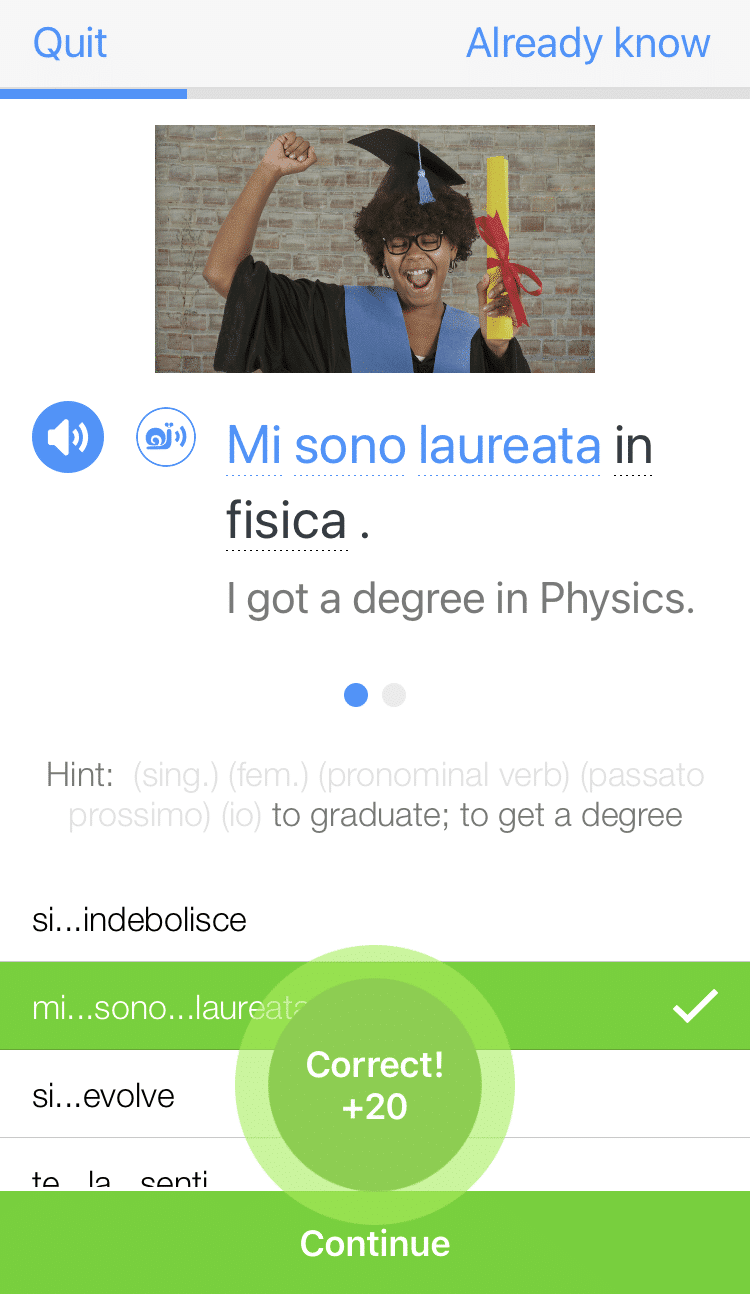
The Imperfect Tense in Italian: A Complete Guide
If you want to describe a hazy past state of things, your go-to Italian tense for that is the imperfect, or imperfetto.
This is a topic for low-intermediate learners and this article assumes as much. You should have basic vocabulary and an excellent handle on the passato prossimo to take on the imperfect.
Italian beginners should first hit topics that will be more immediately useful for them, like commands and present tense regular and irregular verbs.
That said, the imperfect is relatively regular in its conjugations and not all that difficult to learn. We’ll cover the regular conjugations, irregular conjugations and then go into more detail on how to make use of this lovely little tense.
Contents
- How to Conjugate Regular Verbs in the Italian Imperfect Tense
- How to Conjugate Irregular Verbs in the Italian Imperfect Tense
- When, Why and How to Use the Imperfect Italian Tense
- How to Practice the Italian Imperfect
- And One More Thing...
Download: This blog post is available as a convenient and portable PDF that you can take anywhere. Click here to get a copy. (Download)
What Is the Italian Imperfect Tense?
We use the Italian imperfect to set the scene for a story, describe a situation, talk about oft-repeated past actions, designate time between past actions and much more.
It corresponds roughly with English phrases like “we were traveling” or “we used to travel.”
The imperfect stands in particular contrast to the passato prossimo (near past)—the Italian past tense that learners should tackle first because it’s more widely useful.
The passato prossimo is used for events and corresponds roughly to the simple past tense in English (“we traveled”).
How to Conjugate Regular Verbs in the Italian Imperfect Tense
Most verbs—even those that are frustratingly irregular in other tenses—are regular in the imperfect.
We simply remove the –are, –ere or –ire from the infinitive form and add the corresponding imperfect endings.
Imperfect Tense Endings of Regular -are Verbs
| Pronoun | Conjugation Ending |
|---|---|
| io (I) | -avo |
| tu (you) | -avi |
| lui / lei (he / she) | -ava |
| noi (we) | -avamo |
| voi (you all) | -avate |
| loro (they) | -avano |
Here are examples of short sentences in the imperfect with the verbs andare (to go) and cucinare (to cook):
Andavamo a Napoli sempre in treno. — We used to always go to Naples by train.
Cucinavo per i ragazzi quando è suonato il telefono. — I was cooking for the kids when the phone rang.
Imperfect Tense Endings of Regular -ere Verbs
| Pronoun | Conjugation Ending |
|---|---|
| io (I) | -evo |
| tu (you) | -evi |
| lui / lei (he / she) | -eva |
| noi (we) | -evamo |
| voi (you all) | -evate |
| loro (they) | -evano |
Here are examples of the –ere verbs sapere (to know) and avere (to have):
Sapevo che sarebbe stato difficile. — I knew that it would be difficult.
Anni fa avevamo piu tempo. — Years ago we used to have more time.
Imperfect Tense Endings of Regular -ire Verbs
| Pronoun | Conjugation Ending |
|---|---|
| io (I) | -ivo |
| tu (you) | -ivi |
| lui / lei (he / she) | -iva |
| noi (we) | -ivamo |
| voi (you all) | -ivate |
| loro (they) | -ivano |
Here are some examples with the -ire verbs uscire (to go out) and sentire (to feel, to hear):
Uscivo con una catalana per dimenticare la nepoletana. — I was going out with a Catalan in order to forget the Neapolitan.
Ci sentivamo meglio via Skype. — We were able to hear each other better over Skype.
Memorization strategy: Note that the verb endings above are the same across –are, –ere and –ire verbs except that the first letter of the ending changes corresponding to verb type.
For regular verbs you could thus just think of the imperfect as taking off the final –re of all these infinitives and adding –vo, –vi, –va, –vamo, –vate and –vano.
Pronunciation note: The pronounced stress for all imperfect conjugations is on the penultimate (second-to-last) syllable—except for the loro form, which gets antepenultimate (third-from-last) stress.
So, bolding the stressed vowel, we say:
io andavo (I was going) and noi andavamo (we were going) but loro andavano (they were going).
How to Conjugate Irregular Verbs in the Italian Imperfect Tense
As noted above, this is a relatively regular tense and is much easier to learn than, say, the present or the passato prossimo. But there are still some irregular verbs in the imperfect.
First, we’ll look at the imperfect conjugations of essere (to be):
| Imperfect conjugations of essere (to be) | |
|---|---|
| I was / used to be | io ero |
| you (informal singular) were / used to be | tu eri |
| he / she were / used to be | lui/lei era |
| we were / used to be | noi eravamo |
| you (plural) were / used to be | voi eravate |
| they were / used to be | loro erano |
Aside from essere the other irregular verbs to beware of in this tense are those always-troublesome Italian contracted infinitives.
When verbs end in –arre, –orre and –urre, or with verbs like bere, dire and fare, you’ll use the expanded stems as usual (for example as you learned with the present continuous) and then add the imperfect –ere endings:
| Pronoun | Conjugation Ending |
|---|---|
| io (I) | -evo |
| tu (you) | -evi |
| lui / lei (he / she) | -eva |
| noi (we) | -evamo |
| voi (you all) | -evate |
| loro (they) | -evano |
This produces conjugations as follows for verbs like dire (to say) and fare (to do):
Me lo dicevi spesso! — You were saying this to me often!
Facevamo la spesa sempre vicino alla stazione. — We always used to shop near the train station.
When, Why and How to Use the Imperfect Italian Tense
The imperfect is somewhat similar to the functionality of “used to” and “was doing” in English.
The main use of the imperfetto is to talk about the past, and so we’ll first look at how it contrasts with the Italian past tense you should have already studied, the passato prossimo.
Imperfect Versus the Passato Prossimo
The imperfect is great for setting a scene, habitual actions and states of affairs. When we use it, we don’t have any particular sense of when exactly the action was completed.
The passato prossimo is instead for points in time and actions that had concrete beginnings and ends (however long the action actually took doesn’t matter—whether years, months or seconds).
The passato prossimo is also used like the present perfect in English for actions that started in the past and have continued into the present.
Throughout the examples in this article, it may be useful to notice the words in Italian that tend to “trigger” the use of the imperfect. While it’s the meaning that’s important, noting these Italian trigger words can be helpful. It’s much less useful to focus on the English translations, as those don’t always lead to the imperfect, and in any case there would be various possible ways to translate many of the phrases into English.
So let’s take a look at some imperfect uses that set scenes but not start and stop points.
Da bambino portavo sempre scarpe da tennis. — As a child I always wore tennis shoes.
D’inverno affittavamo il nostro appartamento come alloggio temporaneo per studenti. — In the winter we would rent our apartment as temporary lodging for students.
It can be particularly useful to contrast how essere (to be) changes meaning from the imperfect (the first example below) to the passato prossimo (the second):
Era una esperienza emozionante per loro. — It was an exciting experience for them. (That is, they were doing this thing all the time over a vague past period and it was a fun and interesting experience. The experience could be either oft-repeated and/or over a long period.)
È stata una esperienza emozionante per loro. — It was an exciting experience for them. (That is, they went once and it was fun.)
When you have both the imperfect and the passato prossimo in the same sentence, it’s the imperfect that’s generally setting the scene for a discrete action that took place in the passato prossimo.
Ieri indossavo scarpe da ballo quando mi sono fatto male. — Yesterday I was wearing my dance shoes when I hurt myself.
Other Uses of the Italian Imperfect
But wait, that’s not all! The imperfect has a number of “secondary” uses in Italian.
With the verb stare (it’s regular in the imperfect, by the way) plus per you can talk about having been about to do something.
Stavamo per partire quando il forno è esploso. — We were about to leave when the oven exploded.
Stavamo per salutare quando è arrivata Raffaella. — We were about to say goodbye when Raffaella arrived.
When you want to talk about being able to or knowing how to do something in the past you’ll use the imperfect.
Lei non poteva sentire il concerto perché la folla era troppo chiassosa. — She couldn’t hear the concert because the crowd was too noisy.
Riuscivo a correre per un’ora quando ero giovane. — I could run for an hour when I was young.
Sapeva ballare la pizzica. — She knew how to dance pizzica.
With verbs of perception like sentire you don’t necessarily need the helper verb potere (to be able to) to get the same meaning:
Lei non sentiva la musica perché stava molto lontano. — She couldn’t hear the music because she was very far away. (Note that non sentiva very much means that she was not able to hear the music even though it translates literally as “was not hearing.”)
The imperfect along with da can show how long something was going on for, or how long since something happened something else happened.
Quando ho ricevuto un invito a vivere a Barcellona, vivevo a Parigi da tre anni. — When I received an invite to live in Barcelona, I had been living in Paris for three years.
Parlavamo di bambini da 15 minuti quando ho capito che lui non era a suo agio con l’argomento. — We had been talking about children for 15 minutes when I realized that he was not comfortable with the topic.
Cucinavo da tre ore quando lei si è svegliata. — I had been cooking for three hours when she woke up.
Note that the pluperfect could instead be used in situations like this:
Avevo cucinato per tre ore quando lei si è svegliata. — I had been cooking for three hours when she woke up.
Or even a series of verbs in the passato prossimo:
Ho cucinato per tre ore, poi lei si è svegliata. — I cooked for three hours and then she woke up.
Another way to show how long something had gone on for is with essere in the imperfect plus che.
Era già un mese che uscivo con lei quando ho scoperto che aveva un marito. — I had gone out with her for a month when I discovered that she had a husband.
There’s a written use of the imperfect that you don’t find in speech; you’ll see it in writing about history and in journalism. The imperfect is employed to give a sense of immediacy to the events described, even though ordinarily the passato prossimo would be used.
L’importantissimo scrittore Donald Barthelme nasceva nel 1931. — The very important writer Donald Barthelme was born in 1931.
Putin lasciava il posto nel KGB in un momento non definito, o forse non lo ha lasciato mai! — Putin left his post in the KGB in an undefined moment—or perhaps he didn’t leave it ever!
Il 1 d’ottobre i catalani votavano, nonostante la violenza della polizia. — On October 1 the Catalans voted in spite of the police’s violence.
In that last sentence, it would be possible and perfectly correct to write hanno votato (and that’s what you would say in speech), but writing votavano paints a picture of going out of the house and the effort required to get out there and vote in spite of everything.
There are also colloquial uses of the imperfect to replace the conditional and other tenses. These uses are sometimes considered “incorrect” but they’re very widely used and so to my mind well worth learning and using ourselves as foreigners speaking in Italy.
Me lo potevate dire che arrivavate in ritardo. — You guys could have told me that you were arriving late.
The above is considered “incorrect” but it’s what most Italians will actually say, as it’s much less of a headache than putting together the “correct” sentence, which makes you sound like a bit of a grammar dork:
Me lo avreste potuto dire che sareste arrivati in ritardo. — You guys could have told me that you were arriving late.
Here’s another example of the imperfect used colloquially instead of the conditional:
Se lo sapevo, andavo al concerto. — If I would have known, I would have gone to the concert.
And here it’s used to avoid a past subjunctive plus past conditional headache:
Se Raffaella mi mandava un messaggio, rispondevo subito. — If Raffaella sent me a message, I would have responded right away.
A technically “correct” version could be:
Se Raffaella mi avesse mandato un messaggio, avrei risposto subito. — If Raffaella would have sent me a message, I would have responded right away.
How to Practice the Italian Imperfect
Ready to jump in and practice for yourself?
If you have doubts about conjugations (for example, with the contracted infinitives), WordReference has a useful Italian conjugator. And a great grammar reference and textbook with a subsection on the imperfect is “Soluzioni: A Practical Grammar of Contemporary Italian.”
I’d recommend starting out by using the imperfect to write about your own past, and correcting the texts you write on Lang-8 with native speakers, or with an Italian language exchange partner whom you find online or drifting through your part of the world. You can also of course just pay a teacher for classes.
Whatever you do, practice using the imperfect for setting the scene to tell stories about yourself and others. These questions may help spark thinking in the imperfect:
- What were things like back whenever (when you were a child, when you lived somewhere else, etc.)?
- What things did you used to do?
- What were you able to do? What did you know how to do?
- Think about an important moment in your life, then describe the scene around that moment. What were things like? What were people doing?
Once you’re comfortable writing a bit and feel like you have a handle on the conjugations, see if you can use them in conversation as well. Particularly at first, try to have someone always correct your conjugations so that you’re practicing them correctly.
While it can be tricky to grasp at first, the imperfect is not one of the more problematic issues for most Italian learners.
Since it’s so regular the conjugations just seem to flow, and if anything you may have to watch out that you don’t end up using it more than you should, when the passato prossimo is in fact required.
But little by little, you’ll be setting the scene to recount your past exploits.
You’ll be discussing your vague, unfinished actions.
And you’ll be doing it all without even realizing that you’re using the imperfect perfectly.
Download: This blog post is available as a convenient and portable PDF that you can take anywhere. Click here to get a copy. (Download)
And One More Thing...
If you're as busy as most of us, you don't always have time for lengthy language lessons. The solution? FluentU!
Learn Italian with funny commericals, documentary excerpts and web series, as you can see here:

FluentU helps you get comfortable with everyday Italian by combining all the benefits of complete immersion and native-level conversations with interactive subtitles. Tap on any word to instantly see an image, in-context definition, example sentences and other videos in which the word is used.

Access a complete interactive transcript of every video under the Dialogue tab, and review words and phrases with convenient audio clips under Vocab.

Once you've watched a video, you can use FluentU's quizzes to actively practice all the vocabulary in that video. Swipe left or right to see more examples of the word you’re on.

FluentU will even keep track of all the Italian words you’re learning, and give you extra practice with difficult words. Plus, it'll tell you exactly when it's time for review. Now that's a 100% personalized experience!
The best part? You can try FluentU for free with a trial.
Start using the FluentU website on your computer or tablet or, better yet, download the FluentU app from the iTunes or Google Play store. Click here to take advantage of our current sale! (Expires at the end of this month.)


